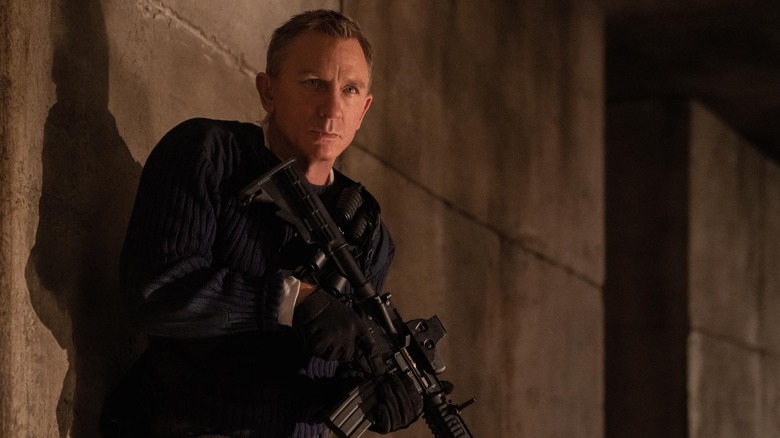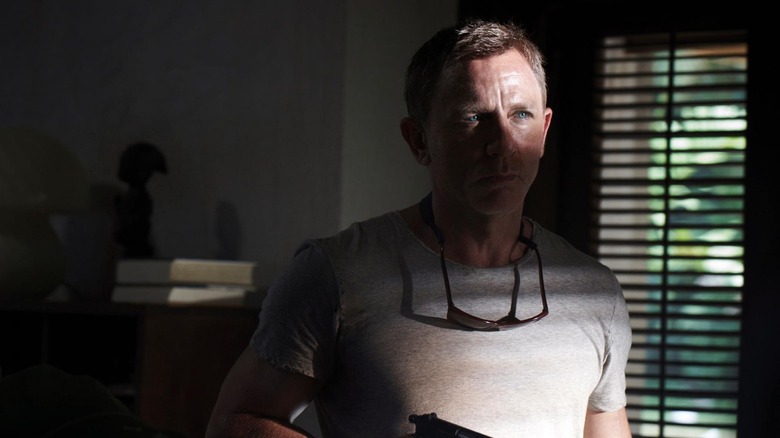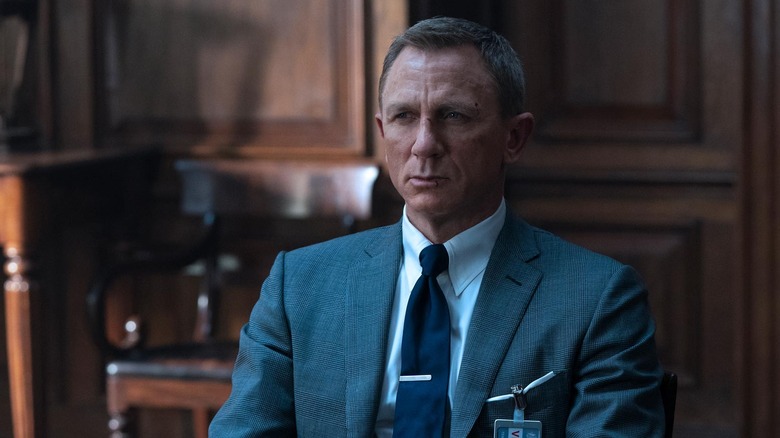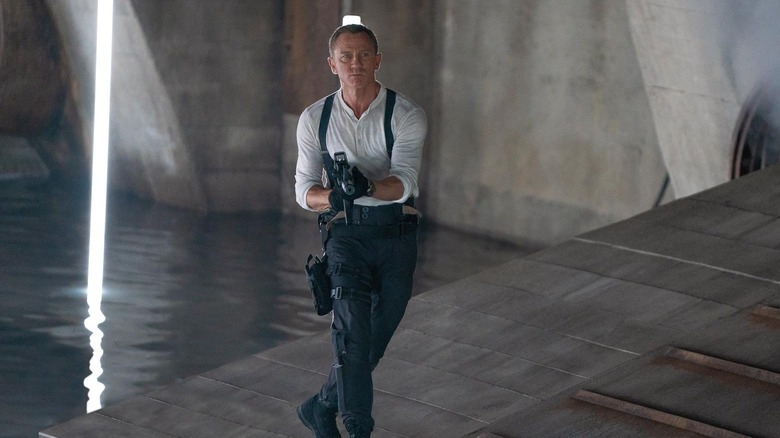No Time To Die Director Cary Fukunaga On Giving Daniel Craig's James Bond A Proper Ending [Interview]
There are a lot of firsts happening in and around "No Time To Die," the 25th official James Bond film. Billed insistently and loudly as Daniel Craig's final adventure as 007, the film itself contains moments and flourishes never before depicted in the series' 59-year history, and those choices will fuel years of fan debate.
But one of the more low-key yet seismic firsts happened behind the camera: Cary Joji Fukunaga is the first American to direct an Eon-produced Bond film. A bold move for a franchise that's more often than not leaned toward the insular, the game-changing gig came on the heels of director Danny Boyle's abrupt departure four summers ago. The Fukunaga announcement in September of 2018 was met with elation by cinephiles; there's a short list of folks whose hiring could've won over public favor after the news that Boyle had departed, but Fukunaga's CV ("True Detective," "Maniac," "Beasts of No Nation") made him an unexpected and exciting choice.
Also unexpected (but considerably less exciting) was just how long Fukunaga would be living with his Bond baby. "No Time To Die" was very publicly the first major release to delay its release over the pandemic, and has changed dates several times since. It's finally hitting American screens this week, after 18 months of fans and box office pundits looking to the film as a kind of signifier of the world returning to something approaching normal.
That's a lot to put on one film, and one director, and a full three years and change after he said yes to Bond producers Barbara Broccoli and Michael G. Wilson, we talked with Fukunaga on the eve of the film's release about breaking into the Eon bubble, bringing his signature style to an existing franchise, and what it would take to bring him back for more. And henleys.
This interview was edited for length and clarity.
"A much healthier creative process."
I'm always curious to know about new creatives breaking into the James Bond family, and the idea of you taking on a tentpole franchise is a particularly intriguing element of "No Time To Die." This is a core group of people — Daniel Craig, Eon, their extended crew — that have been making these films together for 15 years (and some even longer); it's their machine, their sandbox. Is there a trick to breaking into that kind of pre-existing ecosystem, where there are so many other key players who feel a sense of ownership?
I feel like I've come in before to things where I'm trying to service a brand or a personality that already exists. It's like method acting, in a way. You mold yourself into a different perspective, a different tone entirely.
And on top of that, Bond's a bit of a unicorn in that it's a billion-dollar franchise that's also, essentially, a mom and pop outfit. How does that shake out for you as a director? Does that make it harder? Is that weirder?
It makes it better, definitely, to not have notes coming in from executives who just need to put in their opinion on something, simply because it seems like that's what their job needs to be, y'know? To be able to just deal directly with the producers themselves as the arbiters of taste was, I think, a much healthier creative process.
You've mentioned before that you met with Bond producers Barbara Broccoli and Michael Wilson a few years back to discuss a pitch for a new Bond before it was established that Mr. Craig was doing one more. Launching a new actor as Bond is a much different prospect than wrapping up a sitting Bond's run; I'm curious if any of your ideas from that meeting made their way into this film?
Nothing from that meeting. I mean, I still have a pitch I would do if I had to reboot it, which I'll keep for myself for right now.
Oh! Let's come back to that.
But this was a completely clean slate. In September of 2018 I was just listening to everyone, what was working, what wasn't working, what they wanted, what they hoped for, and just had to sit with that and try to figure out how to turn that into a story.
Inevitably, things seep in, things you've tried before and other stories that didn't work, but you're just looking for that place that it could fit, you know? I kind of think of it like spare furniture, but it very much came out of those meetings in September, and then went on until we finished shooting.
"I also relished that challenge."
There's a story that Bond screenwriters Neal Purvis and Robert Wade tell about "Spectre," a film on which they were brought a bit late in the process, and they were told, "Whatever you do, just make sure a helicopter crashes into Westminster Bridge, because we've already built that." Was there any sort of "Five Obstructions"-type challenges like that here? Like, "off you go, but make sure this happens in this film?"
A little bit. I mean, there were a lot of set pieces already built from Danny Boyle's film. And there was a moment with Mark Tildesley, who stayed on board as the production designer, where we were like, "Do we use any of these things? There are some cool components in there." Ultimately we didn't, but some elements, some imagery I would say filtered over. But not a whole lot. There were ideas the producers had that they wanted to maintain in the story. So rather than obstructions, I looked at them more if you're thinking about a race, like markers in a race that you have to make your turns on.
Historically, the cinematic Bond has been a series of variations on an evergreen, eternal character. But one of the hallmarks of the Daniel Craig era actually hearkens back to Fleming, in that he is preoccupied with time, with his own finite existence, dwelling on his own mortality. That's right out of the books. So it makes sense that he would be the first Bond to get an actual finale, but was coming in on the last leg of that journey part of the appeal for you, or was that daunting as hell?
On the one hand, it was an advantage to have that interconnected universe that had been established since "Casino Royale." On the other hand, I think ending or concluding a run for a character is hard. You're going to disappoint some people, and you're going to run into all kinds of challenges to try to make something satisfying. And, usually, endings don't work. I've seen so many great trilogies or TV series that don't end in a way that feels befitting of the characters, the tone, or what you'd hoped for or anticipated. So I knew I was setting myself up for a big challenge by taking on this final chapter, but I also relished that challenge.
On the Fleming tip, did you brush up on the source material at all? Bond fans, since 2019, have been bouncing off the walls that you guys took Bond back to Jamaica. And I won't spoil details here, but there are bits of Fleming in this movie that fans have been waiting decades to see. I'm curious what your relationship is to that literary DNA of the character.
One of the first books Barbara gave me to read was "You Only Live Twice," and I feel like there is a lot (in "No Time To Die") from that story. There's a lot from the short stories that I put in there. In Fleming's story "For Your Eyes Only," he's sent to America to kill this drug smuggler from Cuba. And he ends up running into another assassin on the way to this house to do it, and she's basically looking for revenge.
But on his way there, he's just thinking about his role as judge, jury, and executioner, and the moral conflict there. And what I loved about it was the way we get inside of his head in a way that the films seldom do. But the way Daniel Craig has played Bond, I feel, is much more like the Fleming character, in terms of that quiet, which means that there is an inner monologue going. We just don't always get the opportunity to hear it.
In writing his character, you have to understand what that is though, to understand his motivations. There were was conversations I had with Daniel about how it's so hard to write Bond, actually. Because he is mysterious in so many ways, and it's fine when you're a viewer, but a whole other thing when you have to write it or, in Daniel's case, act it.
"They're good for attacking a villain's lair, and they're good for doing interviews."
The film has one of your great, single-take action beats in the third act. How does something like that come into being at this point? Is the producer saying, "Cary, do your long take thing?" Or is this a creative challenge that you set up for yourself?
It was something I wanted to do at some point, if it fit. But I wasn't going to do it just to do it. And as we were moving forward with the story, there didn't seem like any obvious places for a longer take. So when an opportunity came to do something that felt in the moment and felt like a gauntlet, it was something I definitely pushed for.
Is it a hard sell on set?
Daniel's a perfectionist, so he wants every punch, every shot, everything just to be, on a physical level, flawless. And even just that early fight in Matera, where he does three or four combos with Primo (Dali Benssalah) before he wraps the laundry line around his neck, Daniel would have preferred to do that in cuts, just so he can make sure every punch looked good.
And I was like, "Daniel, these look perfect. There's nothing to worry about here. These are pretty pitch-perfect hits. We don't need to get coverage here." But it comes from his desire, which I share, to make sure that when people watch, there's no suspension of disbelief issues, no doubts that those aren't real hits landing, or himself taking hits.
So to then pitch another single-take shot (that lasts even longer) later in the film, that was something that we talked about at length with the producers and the stunt coordinators, and discussed, "Well, what could we do that no one feels like the performance is being sacrificed?"
When you did a video interview for "No Time To Die" last year, I noticed you were literally wearing the Rag & Bone henley that Bond himself is wearing in the last third of the film. Do you influence the clothing? Does the clothing influence you? Are you taking stuff from wardrobe home with you? What's going on there?
I mean, I've been wearing henleys for years. My friend used to work at Rag & Bone, so I get it for free. They're so old now they're falling off my shoulders. But I think when (costume designer) Suttirat Anne Larlarb and I were talking about what he could wear, they're just a very comfortable garment. I mean, they're good for everything. They're good for attacking a villain's lair, and they're good for doing interviews.
Fair enough. So you said you were going to keep the details to yourself, but historically, most Bond directors don't tend to do just one Bond movie. What would bring you back?
I mean, it's up to the Broccoli family. If they enjoyed working with me and want me back, then we can have that discussion at that time. On a straight practical level, that movie took it out of me. For 21 months, I didn't see anybody. Then lockdown happened, so I didn't see anybody on top of that for many more months.
So, after this shoot (the Steven Spielberg-produced "Masters of the Air" from Apple TV+) is done, I'm going to be merging back into the world. And I want to get a sense of what I want to do next outside of the nonstop work train and figure out what that direction might be, and if it ends up being a Bond film in the future, great. If it doesn't, it was an amazing experience.
"No Time to Die" hits theaters on October 8, 2021.



